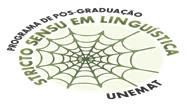Banca de QUALIFICAÇÃO: AMAURI MORET DA SILVA
Uma banca de QUALIFICAÇÃO de DOUTORADO foi cadastrada pelo programa.DISCENTE : AMAURI MORET DA SILVA
DATA : 04/11/2022
HORA: 14:30
LOCAL: On-line (Plataforma Meet)
TÍTULO:
PORTUGUESE LANGUAGE CLASSES FOR THE DEAF STUDENT: THE WORD OF THE SELF THAT TEACHES AND OF THE OTHER THAT LEARNS
PALAVRAS-CHAVES:
Dialogical theory of language. Deaf students. Portuguese language. Reading. Inclusive education.
PÁGINAS: 140
GRANDE ÁREA: Lingüística, Letras e Artes
ÁREA: Lingüística
SUBÁREA: Lingüística Aplicada
RESUMO:
This thesis is part of the research line Studies of Processes and Social Practices of Language, of the Postgraduate Program in Linguistics, of the Mato Grosso State University (UNEMAT). The general objective was to investigate the teaching-learning process of reading in Portuguese language classes for deaf students, from the inclusive school education perspective. To this end, a case study was conducted - during classes occurred remotely - in a specialized educational service class for deaf students in a municipality of Rolim de Moura-RO school. The study is based on the dialogical theory of language, by Bakhtin and Circle (2011; 2018), considering the conceptions of dialogical relations, concrete enunciation and active and responsive comprehension. It is defended the thesis that the deaf student’s learning difficulty is based on the teaching mode(s) for the application and use of the Portuguese language. In this sense, the hypothesis that supports this work is that the conception of teaching Portuguese language for non-deaf students assumed by teachers, reflects on the deaf student’s learning. This is a qualitative research, whith a dialogical approach, guided by the following questions: 1) What are the strategies used by teachers of Portuguese language and Libras for the teaching of reading to deaf students? 2) How the strategies adopted by teachers of Portuguese language and Libras favor (or not) the learning of deaf students for the contents of Portuguese language, especially reading? 3) What conceptions of language and teaching-learning support Portuguese language and Libras teachers’ practice in teaching reading to deaf students? The contributions of this research are directed to the deaf students’ reading comprehension in a second language, considering the methodologies chosen by teachers for learning the Portuguese language. Regarding the methodological approach, data were generated from the observation of 18 (eighteen) classes, via Google Meet platform, recorded by using the Screen Recorder Studio application; (ten) show that the deaf teacher has more skills in teaching Portuguese to the deaf, without neglecting the teaching of Libras, while the hearing teacher prioritizes conceptual approaches in Libras, without making relation with the Portuguese language. It was found that the elements of concrete statements constituted by teachers permeate the active/responsive understanding of deaf students; however, there is a noticeable gap in the methods of language application in teaching. While the deaf teacher explores interaction, visual resources, graphics and seeks, in the students' responses, to involve the content, the hearing teacher makes a contrary movement, making Libras the only source of learning. It is hoped that the results of this research will allow other teachers to resignify their practices in order to contribute to the learning of deaf students.
MEMBROS DA BANCA:
Externo à Instituição - ANA CLAUDIA BALIEIRO LODI - USP
Externo à Instituição - DOUGLAS EHLE NODARI -
Presidente - 124919002 - ELIZANGELA PATRICIA MOREIRA DA COSTA
Externo ao Programa - 83191001 - NILCE MARIA DA SILVA
Externo à Instituição - SANDRA PATRÍCIA DE FARIA DO NASCIMENTO - UnB
Interno - 83247001 - WELLINGTON PEDROSA QUINTINO



